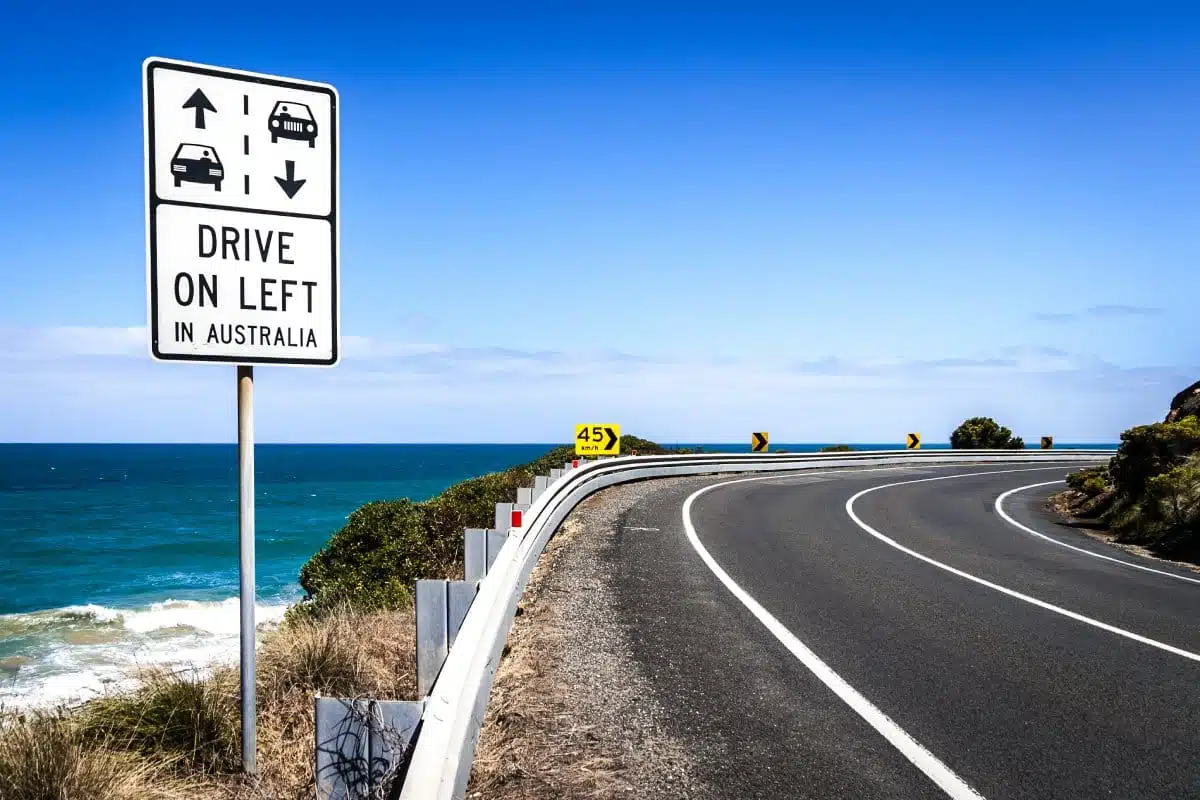The Great Ocean Road, a stretch of road that meanders along the southeastern coast of Australia, offers an unparalleled road-tripping experience. This iconic route, extending over 240 kilometers from Torquay to Allansford, showcases the region’s dynamic history, vibrant ecosystems, and rich cultural vibe. Renowned for its breathtaking views, the road snakes through lush rainforests, beside rugged coastlines, and past serene beaches, presenting many activities and destinations for travelers. This guide aims to provide an insider’s perspective, ensuring a memorable exploration of its natural wonders, wildlife encounters, and historical landmarks.
1. Twelve Apostles
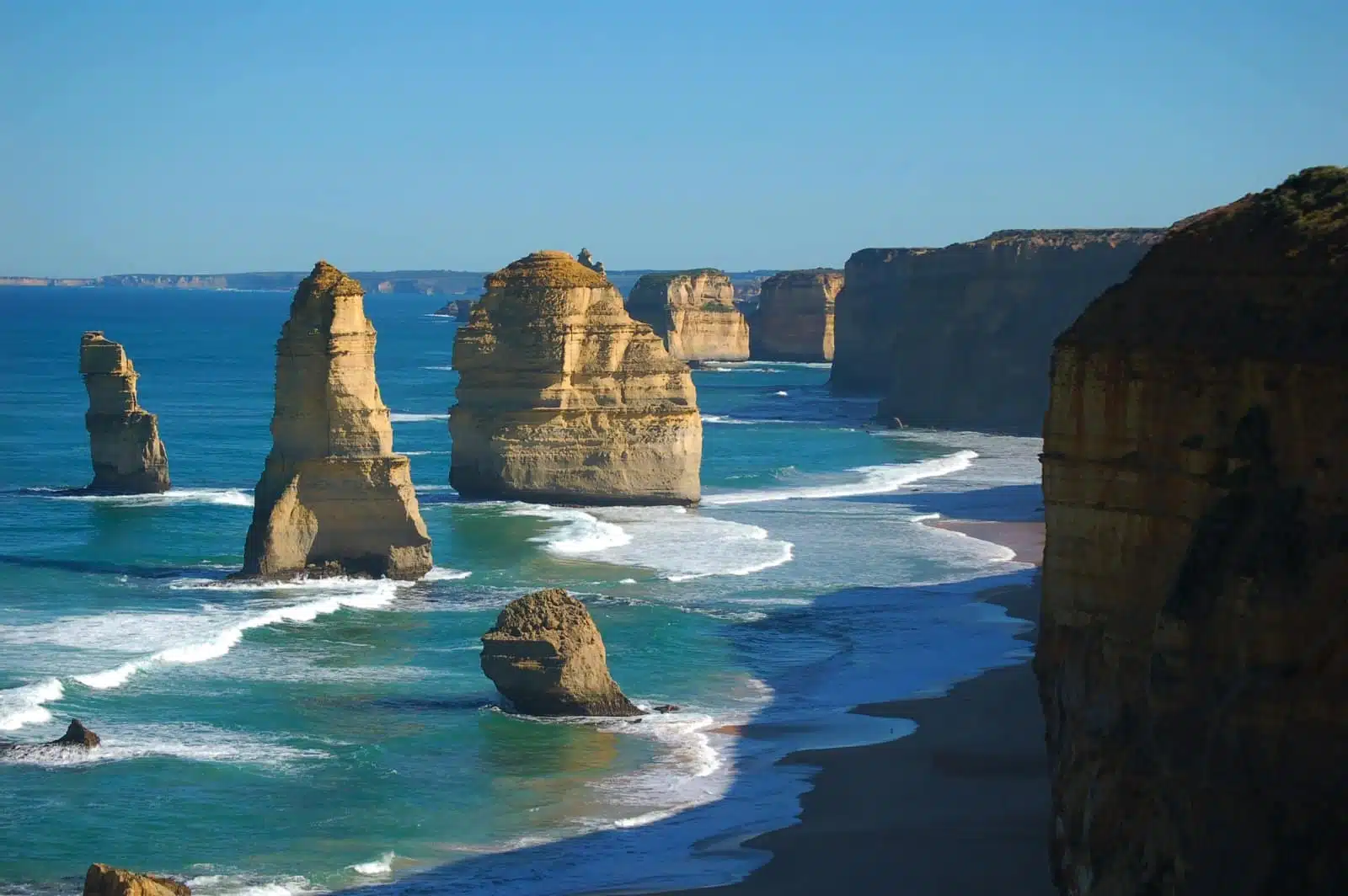
Image Credit: Pexels / Paul Macallan
The Twelve Apostles, a collection of limestone stacks off the shore of Port Campbell National Park, highlights the relentless force of nature. These massive formations, created by erosion over millions of years, present a spectacular sight, especially at dawn and dusk when the changing light paints them in vibrant hues. Despite the name, only eight apostles remain standing today, yet their majesty remains undiminished. The site offers a visual feast and serves as a poignant reminder of the Earth’s temporal nature.
Insider’s Tip: Consider a helicopter tour for a unique viewing experience. It provides a breathtaking aerial perspective that ground-level observation points cannot match, offering a comprehensive view of the apostles and the surrounding coastal landscape.
When to Travel: The best time to visit the Twelve Apostles is during the shoulder seasons of spring (September to November) and autumn (March to May). These periods offer mild weather and fewer crowds, allowing for a more serene experience.
How to Get There: The Twelve Apostles are accessible via the Great Ocean Road, approximately a four-hour drive from Melbourne. Regular tours operate from Melbourne, but driving yourself allows for a more flexible itinerary.
2. Loch Ard Gorge
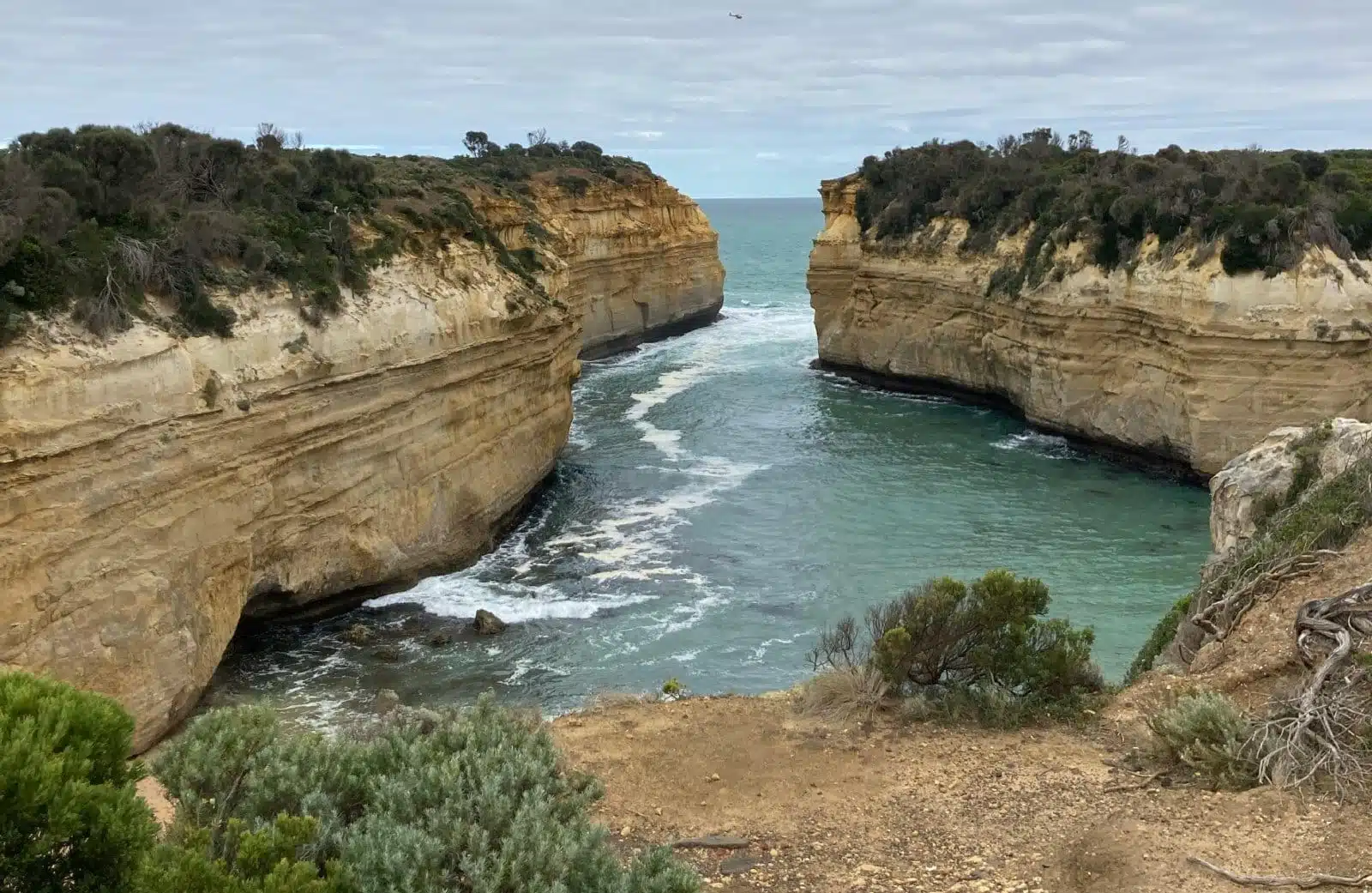
Image Credit: Pexels / Andrew Smith
Loch Ard Gorge, named after the shipwreck of the Loch Ard in 1878, is a site of historical significance and natural beauty. The gorge is enveloped by towering limestone cliffs, offering sheltered, turquoise waters below. This area not only tells a tale of survival and tragedy but also showcases the power of the ocean in sculpting the landscape. The beach at the base of the gorge is accessible via stairs, allowing visitors to experience the serene environment up close. The surrounding cliffs are dotted with interpretive signs that narrate the shipwreck’s story and its two teenage survivors, making it a poignant stop on the Great Ocean Road journey.
Insider’s Tip: Visit at low tide to explore the beach and its surrounding rock pools. This time also offers the best light for photography, capturing the contrast between the cliffs, the sand, and the sea.
When to Travel: The gorge is most captivating during the late spring and early autumn months when the weather is pleasant and the site is less crowded, providing a more intimate experience with nature and history.
How to Get There: Loch Ard Gorge is located just a few minutes drive west of the Twelve Apostles. It’s well-signposted and features a parking area from where visitors can take a short walk to the viewing platforms and stairs leading down to the beach.
3. Great Otway National Park
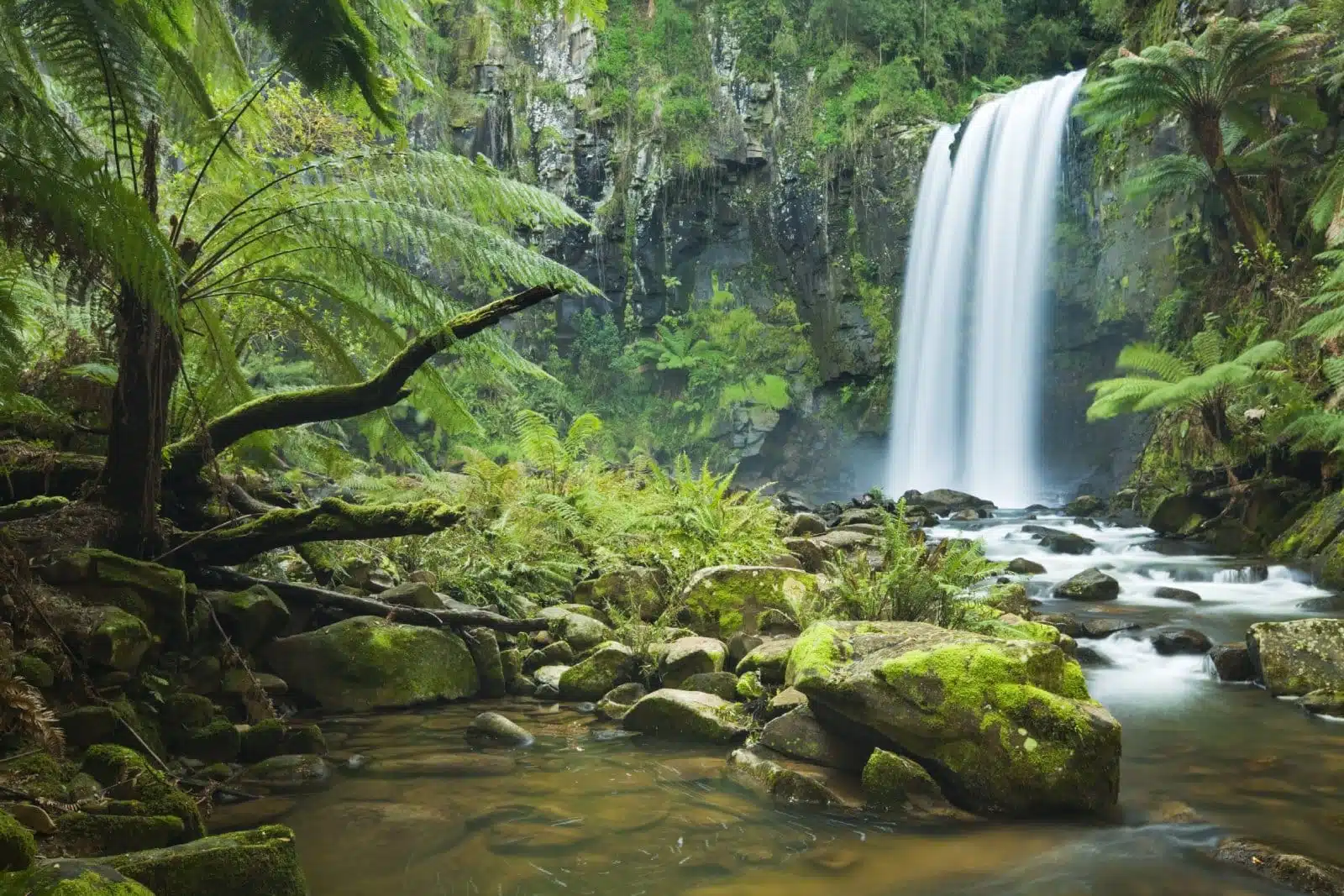
Image Credit: Shutterstock / Sara Winter
Great Otway National Park is a diverse natural sanctuary that spans from the rugged coastlines of the Great Ocean Road to the hinterlands’ dense forests. This park is a haven for nature enthusiasts, offering many activities such as hiking, mountain biking, and wildlife spotting. The park’s landscapes are incredibly varied, featuring cascading waterfalls, ancient rainforests, and serene lakes. The Otway Fly Treetop Walk is a highlight, allowing visitors to stroll among the treetops on a suspension bridge for a unique perspective of the forest.
Insider’s Tip: For an unforgettable experience, plan a visit during the evening to witness the glow worms at Melba Gully. It’s one of the best places to see these bioluminescent creatures, especially after rainfall when they are most active.
When to Travel: The park is a year-round destination, but the best time to visit is during spring (September to November) when the waterfalls are at their fullest and the wildflowers are in bloom.
How to Get There: Great Otway National Park is accessible via the Great Ocean Road, with various entry points depending on the area you wish to explore. Apollo Bay serves as a good base for exploring the eastern section of the park.
4. Apollo Bay
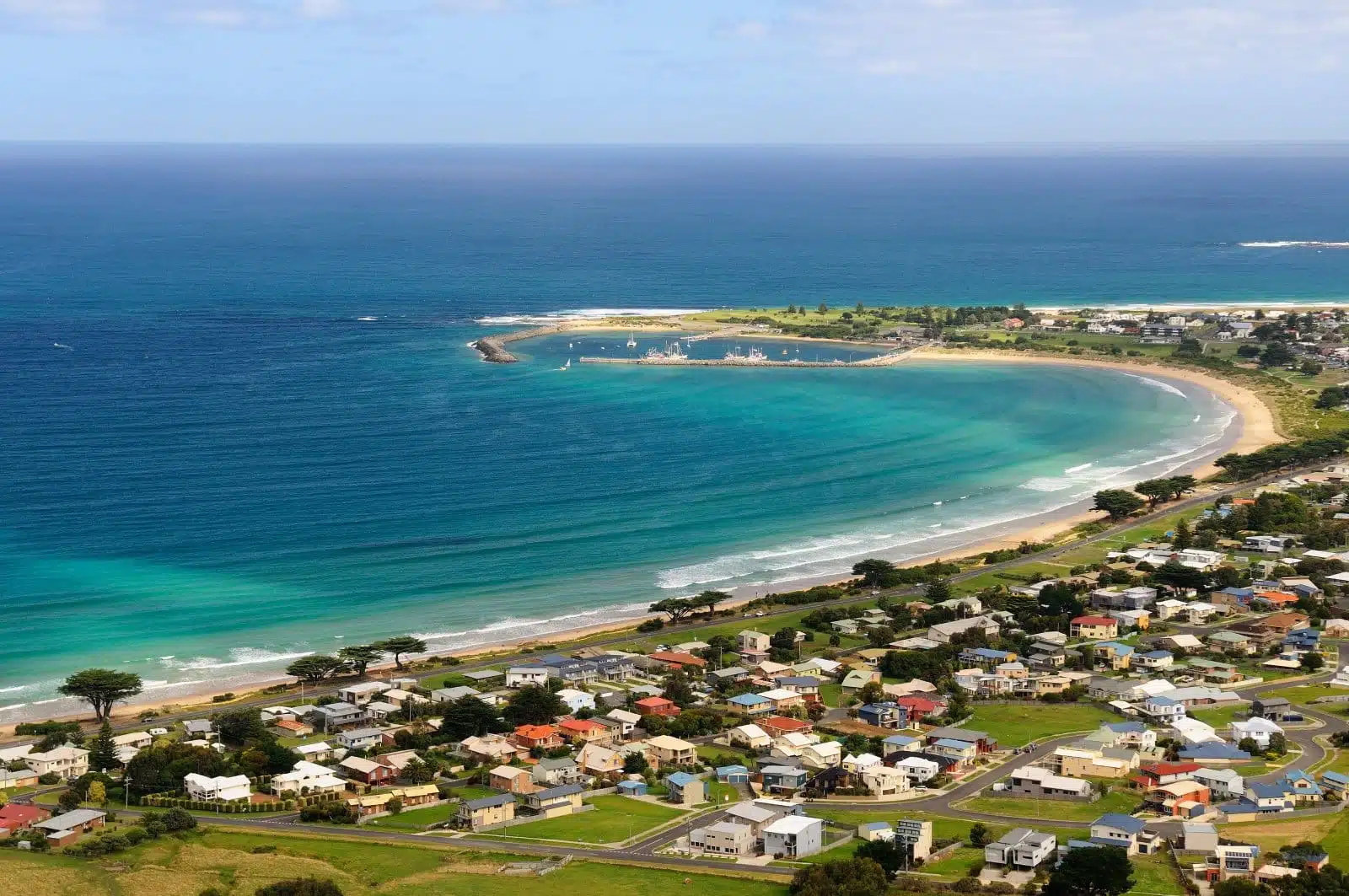
Image Credit: Shutterstock / Jun Zhang
Apollo Bay is a picturesque seaside town nestled in the heart of the Great Ocean Road. It is a gateway to the Great Otway National Park and is renowned for its pristine beaches, rolling green hills, and vibrant local community. The town offers a range of activities, from surfing and swimming at Apollo Bay Beach to exploring the local markets and seafood restaurants. Apollo Bay also marks the beginning of the Great Ocean Walk, a multi-day trek that offers stunning views of the coast and hinterland.
Insider’s Tip: For those interested in local history and maritime heritage, the Apollo Bay Museum is a must-visit. It provides insights into the area’s pioneering past and the significance of the ocean in shaping the community.
When to Travel: Summer (December to February) is the best time to enjoy Apollo Bay’s beaches and outdoor activities. However, if you prefer cooler weather and fewer crowds, consider visiting in autumn (March to May).
How to Get There: Apollo Bay is located along the Great Ocean Road, approximately 2.5 hours drive from Melbourne. It’s an ideal stop for refueling, relaxation, and exploration, making it a perfect midpoint in your road trip itinerary.
5. Bells Beach
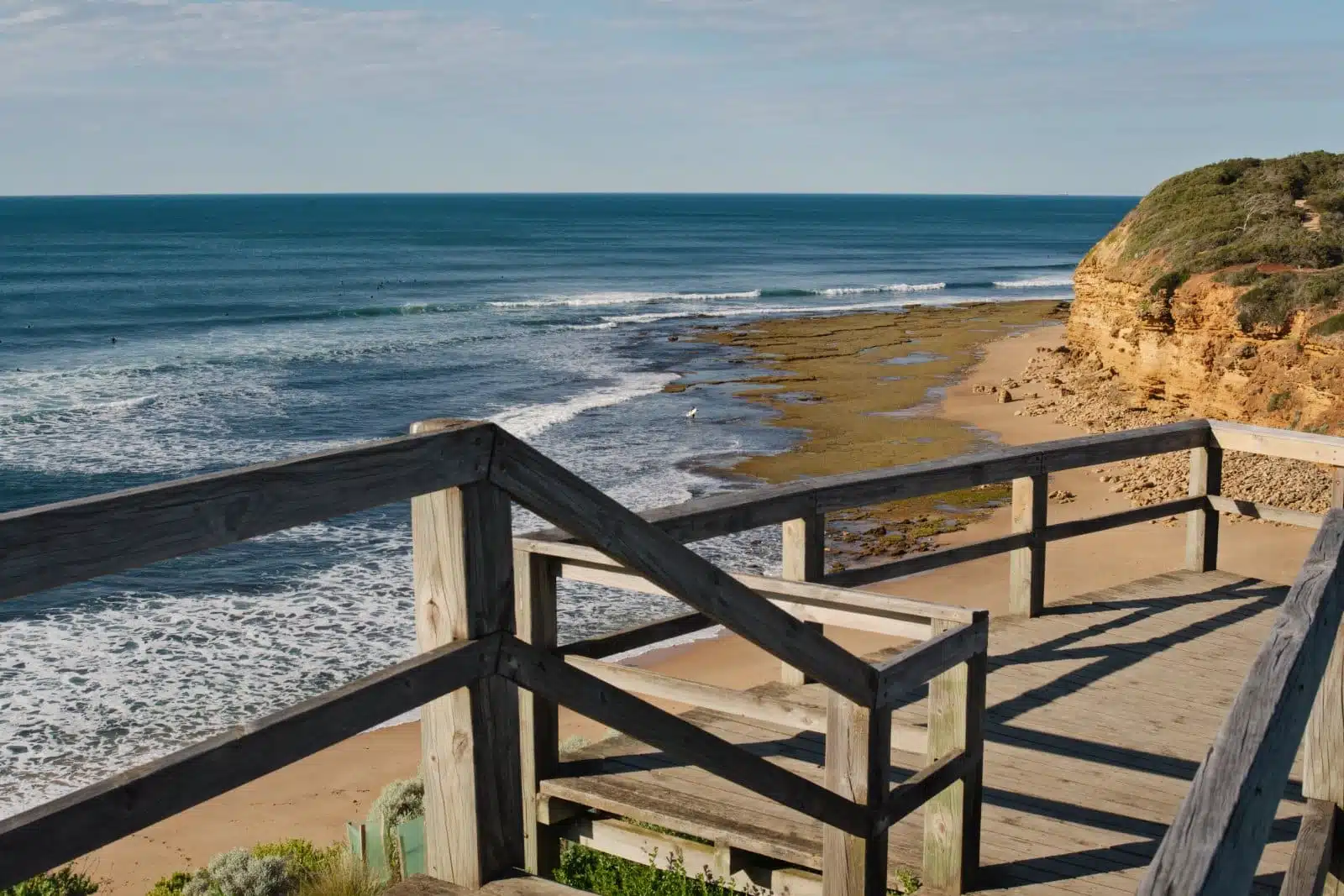
Image Credit: Shutterstock / View Factor Images
Bells Beach, renowned for its powerful swells and natural amphitheater, holds a prestigious position in the surfing world. It is the site of the annual Rip Curl Pro Surfing Competition, drawing competitors and spectators from across the globe. The beach’s unique geological features create conditions ideal for advanced surfing, though all visitors can appreciate its beauty and atmosphere. The cliffs surrounding Bells Beach offer panoramic views of the Southern Ocean, making it a popular spot for photographers and nature enthusiasts.
Insider’s Tip: For non-surfers, the best time to visit Bells Beach is during the Rip Curl Pro event, usually held around Easter. It offers a vibrant atmosphere and a chance to see world-class surfing up close.
When to Travel: While Bells Beach is accessible year-round, the optimal time for surfing is from March to October when the swells are most consistent. For general sightseeing, the summer months offer warmer weather and longer days.
How to Get There: Bells Beach is located near Torquay, at the beginning of the Great Ocean Road, about a 1.5-hour drive from Melbourne. There is a dedicated parking area, from which a short walk leads to the viewing platforms.
6. Cape Otway Lightstation
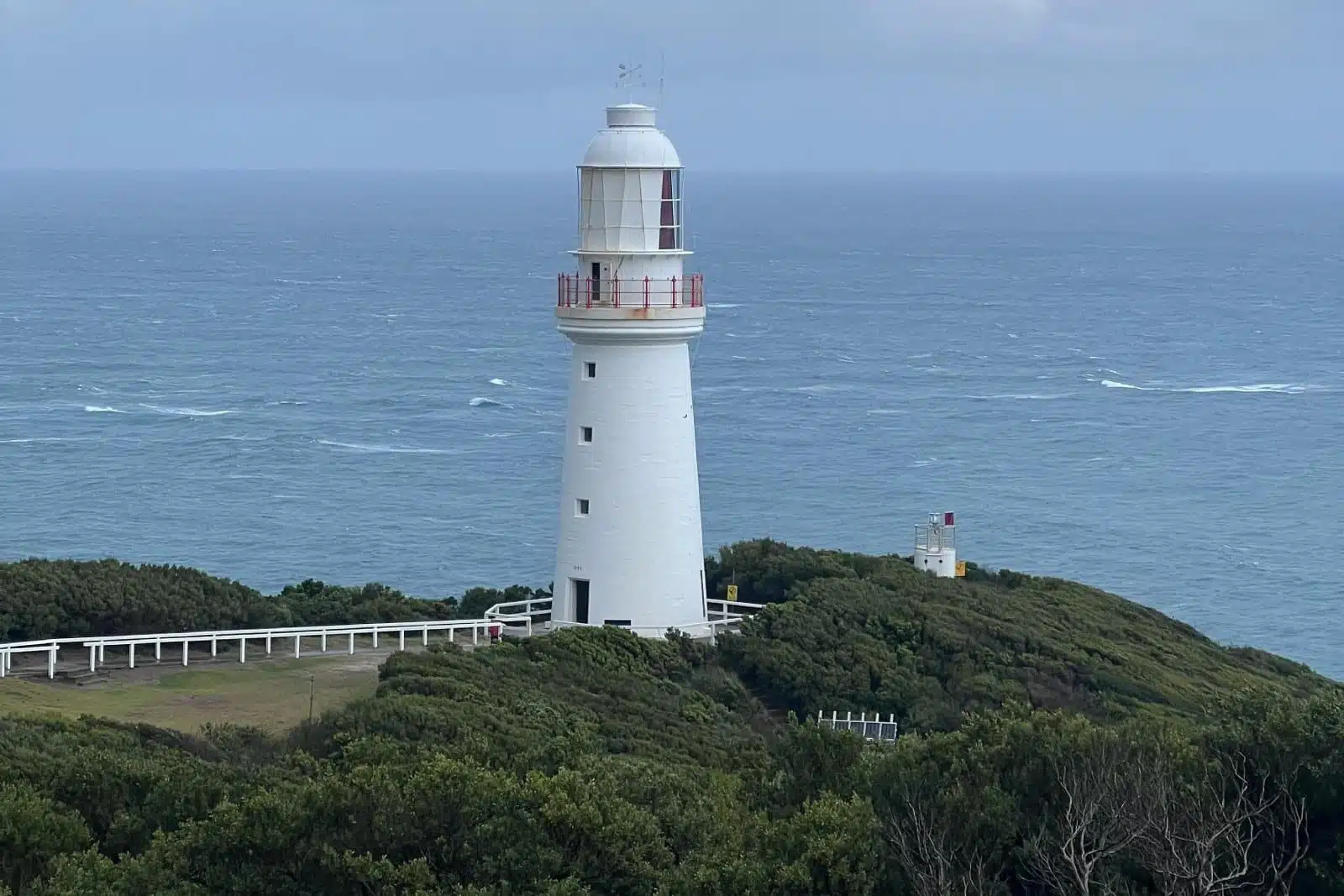
Image Credit: Pexels / Sheena Licayan
The Cape Otway Lightstation, Australia’s oldest surviving lighthouse, has guided vessels along the treacherous Shipwreck Coast since 1848. Visitors can climb to the top for stunning views of the Southern Ocean and the rugged coast. The site also includes the Lightkeeper’s house, which provides a glimpse into the lives of the keepers and their families who once operated the lighthouse. The surrounding Cape Otway area is rich in wildlife, including koalas, kangaroos, and various bird species, making it a rewarding destination for nature lovers.
Insider’s Tip: Keep an eye out for koalas in the eucalyptus trees along the road to the lighthouse. Early morning or late afternoon are the best times for wildlife spotting.
When to Travel: The Cape Otway Lightstation is a year-round destination. However, the cooler months (May to September) offer the chance to spot migrating whales off the coast.
How to Get There: The light station is accessible via the Great Ocean Road, with a detour along Lighthouse Road from Apollo Bay. The drive offers scenic views and numerous spots for wildlife observation.
7. Gibson Steps
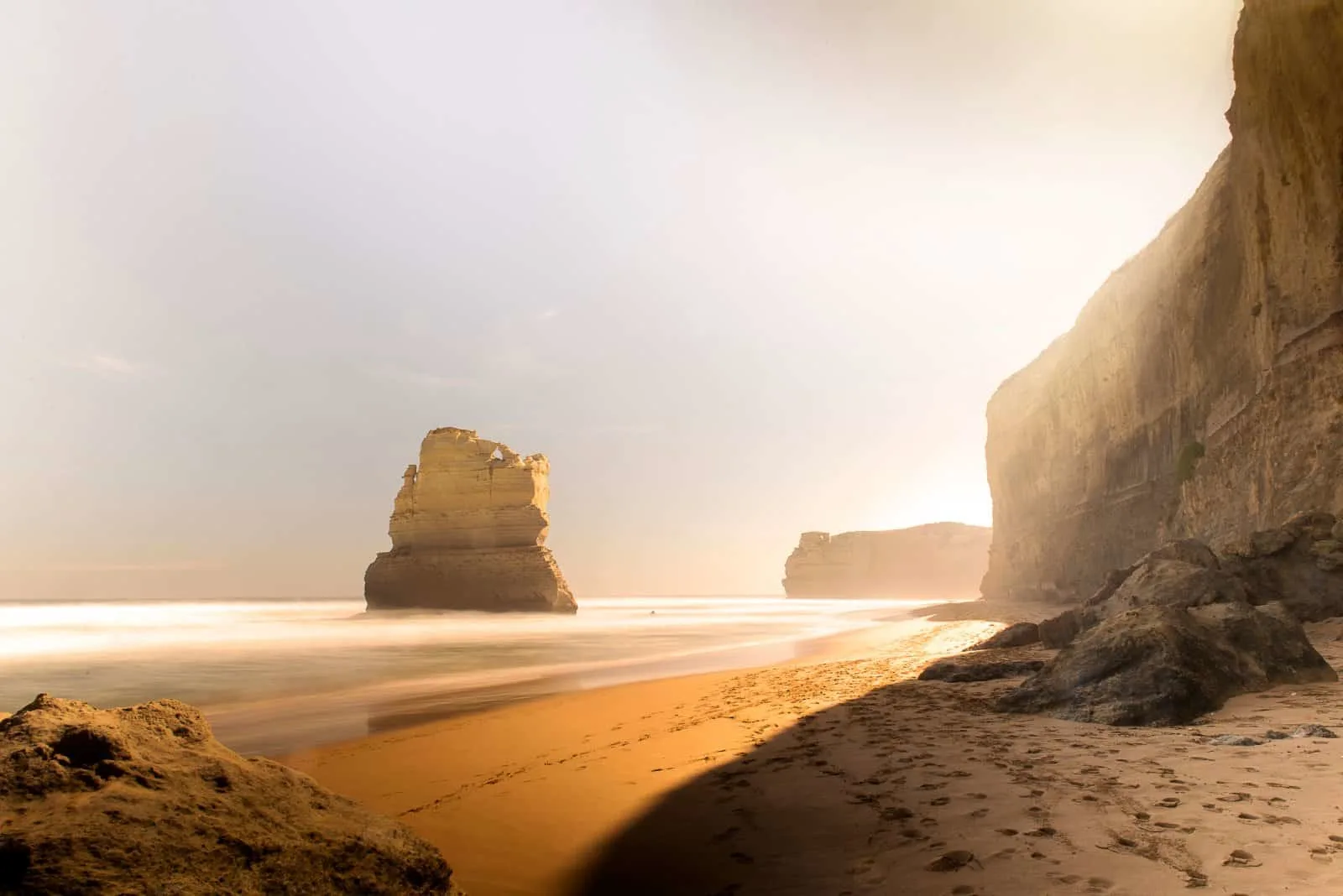
Image Credit: Shutterstock / Tremendous Shots
The Gibson Steps offer an opportunity to experience the scale and beauty of the Great Ocean Road’s coastal landscape from sea level. Located just a few minutes drive from the Twelve Apostles, these steps descend to a stunning beach flanked by towering limestone cliffs and two offshore stacks, Gog and Magog. The site provides a unique perspective of the power of the Southern Ocean and the erosive forces that have shaped this coastline. It’s a popular spot for photographers, especially during sunrise and sunset when the light accentuates the textures and colors of the cliffs and sea.
Insider’s Tip: Check the tide times before your visit to ensure the beach is accessible and safe. High tide can cover the beach entirely, making it impossible to walk along the shore.
When to Travel: The Gibson Steps are accessible year-round, but visiting during the shoulder seasons (March-May and September-November) can offer a more solitary experience with milder weather.
How to Get There: The Gibson Steps are located just off the Great Ocean Road, near the Twelve Apostles. Parking is available on site, and the steps are a short walk from the car park.
8. Port Campbell National Park
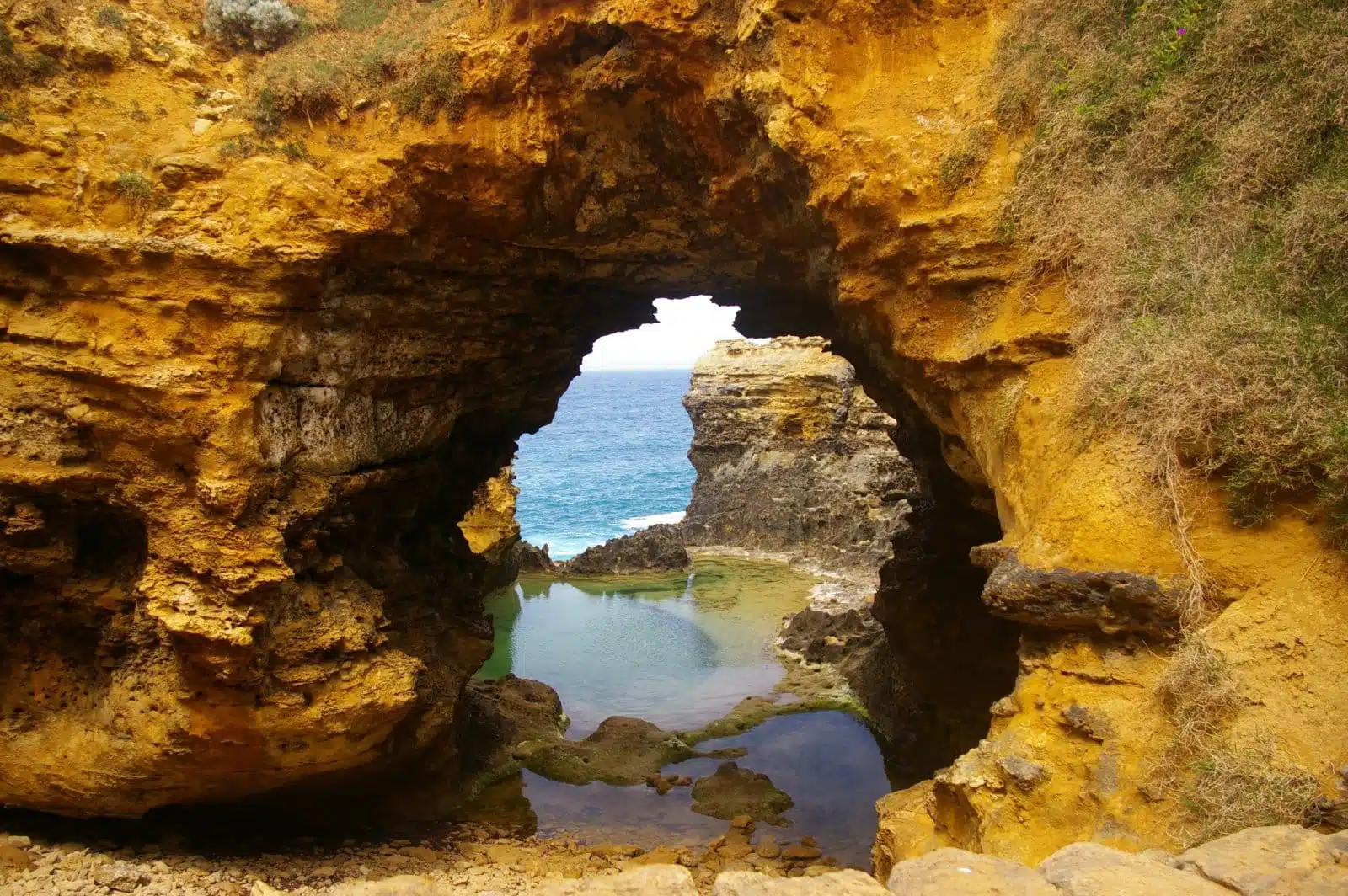
Image Credit: Shutterstock / Wozzie
Port Campbell National Park, encompassing the Twelve Apostles, Loch Ard Gorge, and Gibson Steps, showcases the dramatic coastal scenery that defines the Great Ocean Road. The park’s diverse landscapes include sheer cliffs, rock stacks, arches, and blowholes. It offers numerous walking trails that provide access to its many natural attractions, each presenting a unique view of the Southern Ocean’s relentless sculpting of the coastline. The park is also a sanctuary for native flora and fauna, allowing visitors to encounter the region’s biodiversity.
Insider’s Tip: For an immersive experience, explore the park’s lesser-known trails early in the morning or late in the afternoon to avoid the crowds and increase your chances of wildlife sightings.
When to Travel: The park is a year-round destination, but the best weather conditions are typically in autumn and spring, offering a comfortable climate for hiking and exploration.
How to Get There: Port Campbell National Park is accessible via the Great Ocean Road. The park is well-signposted, with multiple access points and parking areas for the major attractions.
9. The Great Ocean Walk
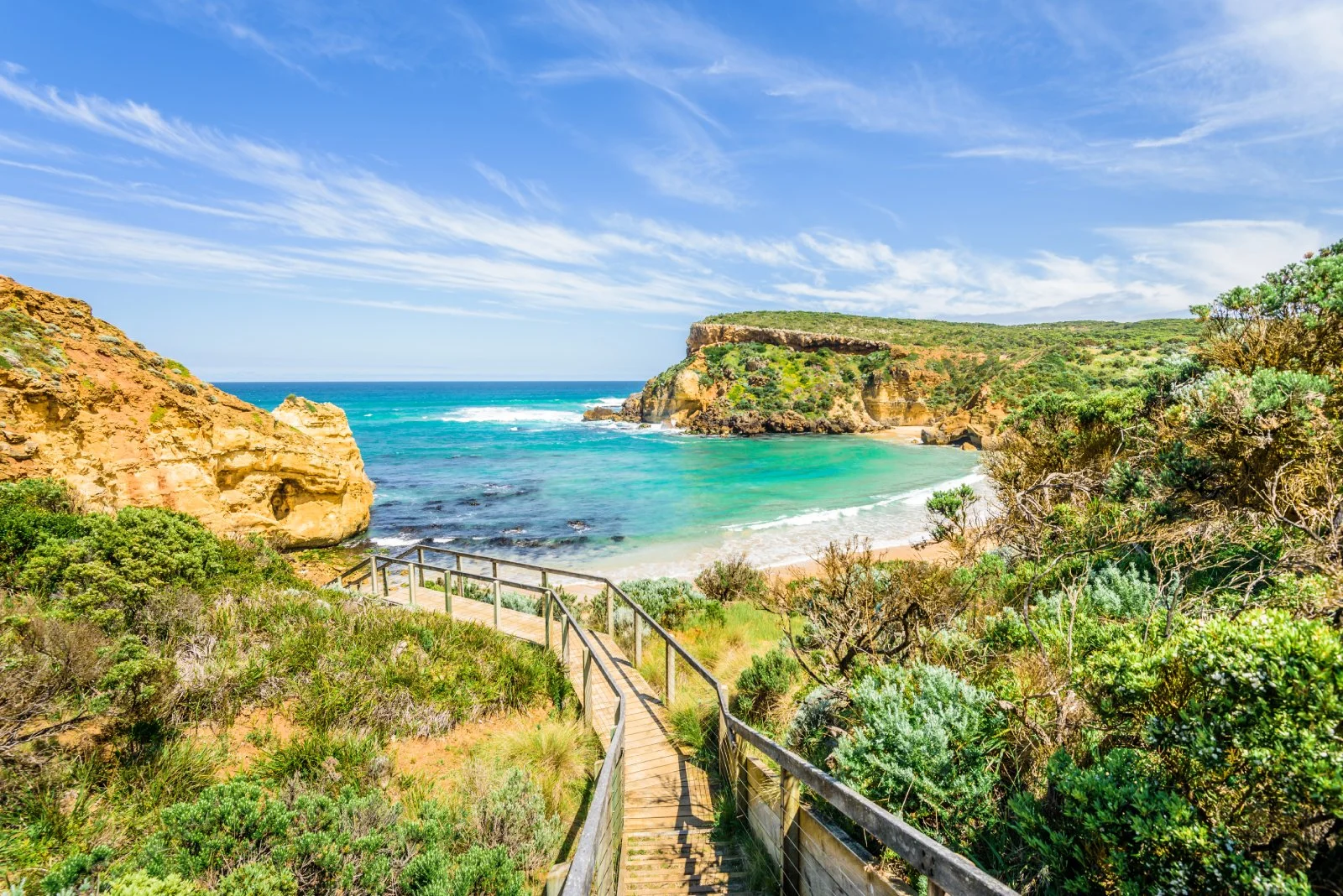
Image Credit: Shutterstock / Tom Jastram
The Great Ocean Walk stretches 100 kilometers from Apollo Bay to the iconic Twelve Apostles, offering hikers a unique way to experience the diverse landscapes of the Great Ocean Road. The trail winds through national parks, along deserted beaches, and atop coastal cliffs, providing stunning views and a sense of solitude. It’s designed to cater to walkers of all abilities, with multiple entry and exit points allowing for shorter walks or the challenge of the entire route over several days.
Insider’s Tip: Consider using the shuttle services available to transport your luggage to your next accommodation, allowing you to enjoy the walk without a heavy backpack.
When to Travel: The best times to undertake the Great Ocean Walk are in the spring and autumn months, when the weather is mild and the path is less crowded.
How to Get There: The trail begins in Apollo Bay, accessible via the Great Ocean Road. Apollo Bay is approximately 2.5 hours drive from Melbourne and serves as a base for walkers to start their journey.
10. Otway Fly Treetop Adventures
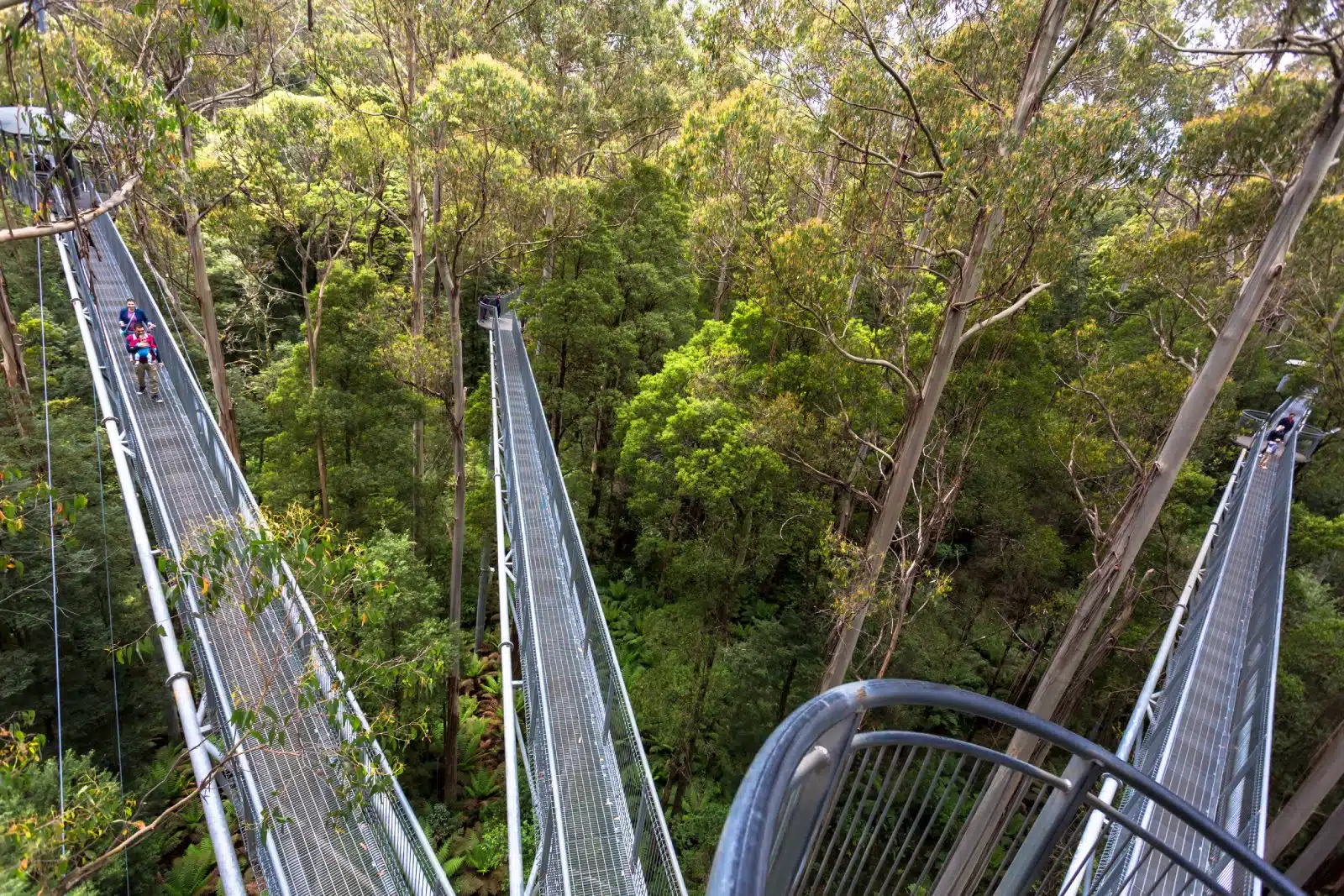
Image Credit: Shutterstock / jefferyhamstock
Otway Fly Treetop Adventures offers a unique perspective of the ancient rainforests of the Otways. Visitors can explore the forest canopy via a 600-meter-long, 25-meter-high steel structured treetop walk or seek thrills on the Zipline Tour, which includes eight cloud stations, six flights, and two suspension bridges. The attraction provides an educational and exhilarating experience, highlighting the ecological importance of rainforest conservation while offering breathtaking views of the surrounding landscape.
Insider’s Tip: For a truly magical experience, visit after rainfall when the forest is lush and waterfalls within the park are at their most spectacular.
When to Travel: Otway Fly Treetop Adventures is open year-round, but visiting during the wetter months (May to October) can enhance the rainforest experience, as the foliage is denser and the waterways are more active.
How to Get There: Otway Fly Treetop Adventures is located in the heart of the Great Otway National Park, accessible via the Great Ocean Road and following signs from Lavers Hill. The journey from Melbourne takes approximately 3 hours.
The Bottom Line
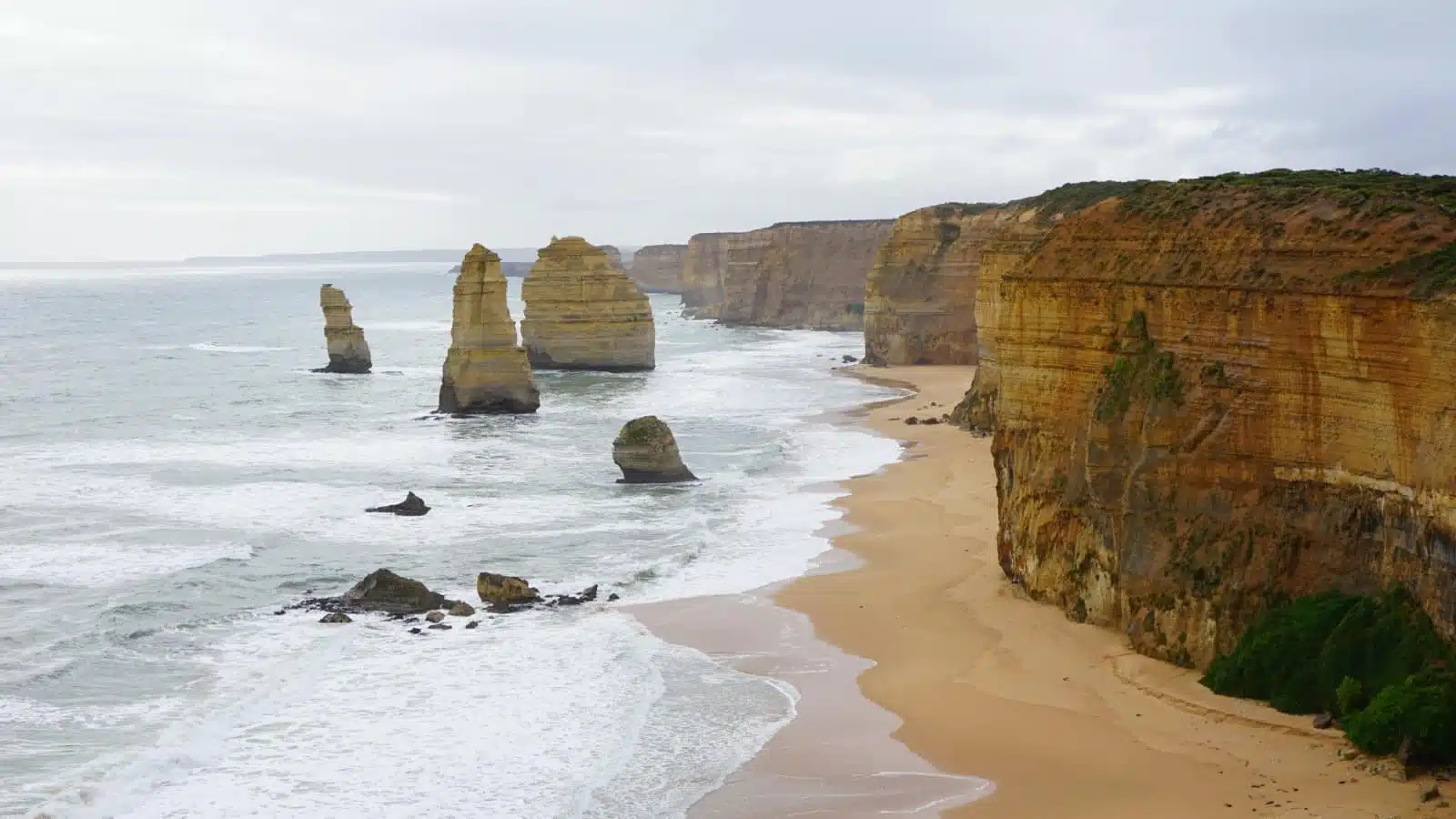
Image Credit: Pexels / Sebastian Ehgartner
Exploring the Great Ocean Road offers a journey through some of Australia’s most stunning and diverse landscapes. From the surf culture of Bells Beach to the historic Cape Otway Lightstation, the dramatic cliffs and serene beaches of the national parks, and the immersive experience of the Great Ocean Walk, each destination provides a unique insight into the natural beauty and cultural heritage of this iconic region. Whether you seek adventure, relaxation, or a deeper connection with nature, the Great Ocean Road delivers an unforgettable experience. With careful planning, respect for the natural environment, and an openness to discovery, travelers can embark on a road trip that surpasses the ordinary, leaving them with memories that will last a lifetime.
More From The Green Voyage
Top 10 Trending Travel Destinations 2024
6 Essential Banking Apps for International Travel – Managing Your Finances on the Go
Traveling With Kids – 10 Tips to Create Memorable Family Holidays
The post Road Tripping the Great Ocean Road – Australia’s Scenic Route 2024 first appeared on The Green Voyage.
Featured Image Credit: Shutterstock / Raphael Christinat.
For transparency, this content was partly developed with AI assistance and carefully curated by an experienced editor to be informative and ensure accuracy.
Tips for Trip Success
Book Your Flight
Find an inexpensive flight by using Kayak, a favorite of ours because it regularly returns less expensive flight options from a variety of airlines.
Book Your Hotel or Special Accommodation
We are big fans of Booking.com. We like their review system and photos. If we want to see more reviews and additional booking options, we go to Expedia.
You Need Travel Insurance!
Good travel insurance means having total peace of mind. Travel insurance protects you when your medical insurance often will not and better than what you get from your credit card. It will provide comprehensive coverage should you need medical treatment or return to the United States, compensation for trip interruption, baggage loss, and other situations.Find the Perfect Insurance Plan for Your Trip
